My daughter was killed in the Bataclan attack – and I made friends with the father of one of the terrorists

On Monday 16 November, 2015, almost 72 hours after the Paris terror attacks, principally on the Bataclan theatre, in which 130 people were killed, Georges Salines was led down the east corridor of the Forensic Institute on the Quai de la Rapée, beside the Seine, to identify the body of his beloved 28-year-old daughter Lola. She had taken a spare ticket to the concert at the Bataclan at the last minute.
It was late afternoon when the family were told they could finally see her, from behind a glass screen. ‘You won’t be able to touch her,’ they were told. ‘Her body is covered in a sheet. Her face is intact, her mouth is a bit open. Her expression is calm, but her face is very red, as no embalming has been carried out and your daughter was lying on her stomach for a long time on the floor of the Bataclan.’
Georges, his wife Emmanuelle, now 62, and Lola’s two elder brothers, Clément, 38, and Guilhem, 36, held each other and sobbed as they looked on at Lola. She was known for her kindness and compassion; she worked as a book editor at a publishing house in Paris and enjoyed roller skating and dancing.
‘She seemed to be sleeping,’ recalls Salines, now 63. ‘Strangely, passing through this stage made us feel better. The serenity of her expression allowed us, and still allows us today, to imagine that maybe she didn’t see death coming, that she was too busy dancing to the music.’
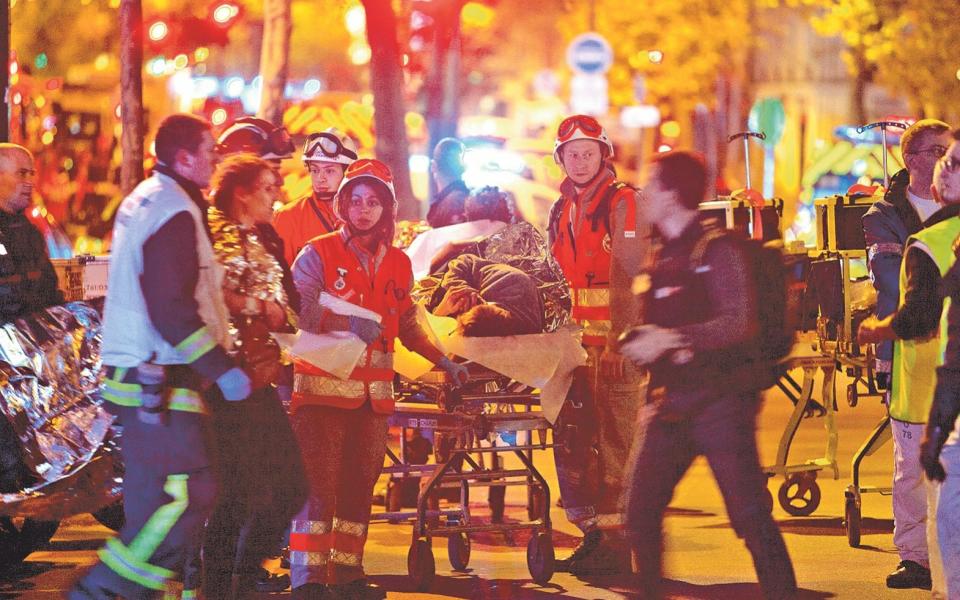
The orchestrated attack on the concert hall, where the band Eagles of Death Metal were playing, and in the surrounding areas, was the worst terror attack in France in modern history. It was the worst violent loss of life in France since the Second World War. Nine terrorists died at the different locations, including three at the Bataclan theatre.
The lunchtime before she died, Lola had met her father for a swim, but their meet-up was briefer than usual because he had forgotten his goggles. Don’t worry, she told him, I’ll come home for lunch tomorrow. ‘I didn’t know there would be no tomorrow for her,’ he says, ‘and that this would be our last ever conversation. I didn’t ask her what she would be doing that evening, either.’
Only when Clément called him at 1am to say Lola had been at the Bataclan and was not answering her phone, did panic set in. Salines, a doctor specialising in public health (who has now retired), clung on to hope. Perhaps Lola’s phone had been dropped in the crush? But after fruitless calls to helplines and a false alarm on Facebook by somebody mistakenly claiming that Lola had been seen alive, hope ebbed away.
On Saturday 14th, they got confirmation that she was dead. ‘I broke down,’ says Salines. ‘It was over… Lola was gone.’
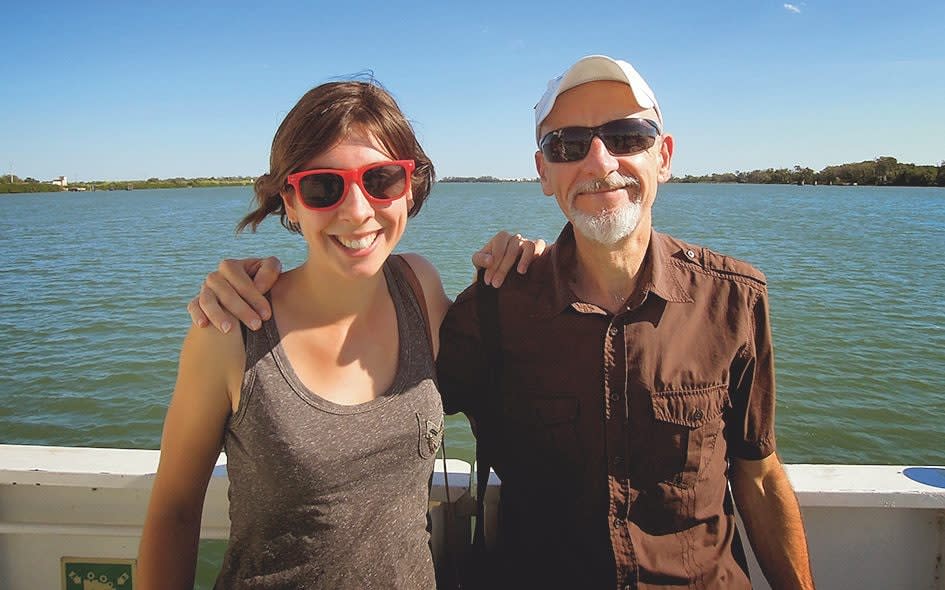
The same day that Georges Salines identified Lola’s body, a SWAT team of 10 smashed down the door of Azdyne Amimour’s apartment in Drancy, Seine-Saint-Denis, a deprived region on the outskirts of Paris. ‘I’ll let you in!’ he shouted when he saw a ray of light through the keyhole, but they shouted, ‘Police, hands up!’
Amimour, now 73, and his wife Mouna, 59, were handcuffed and hooded, put in separate police vans and taken to the offices of the General Directorate for Internal Security, on the north-western side of Paris.
The Amimours had two daughters, Alya, now 36, and Maïssa, 27, and a son, Samy. It was Samy who brought them endless worry.
Once a quiet, well-behaved boy who liked judo and football, Amimour had high hopes for his only son – he wanted him to become a footballer or an airline pilot, and had taught him aeronautical terms, as well as the world capital cities, which Samy had found great fun. But he had begun to change in his teens and in September 2013, at the age of 26, Samy travelled to Syria to join the jihad. His family assumed he had been radicalised online, and with the encouragement of two school friends who went to Syria with him.
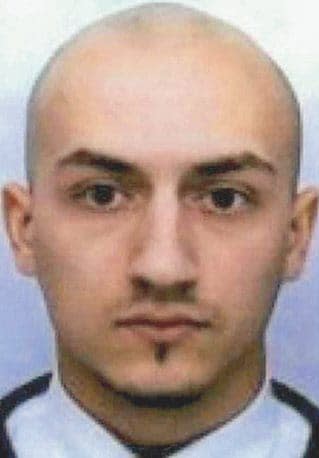
Desperate to persuade Samy to leave the extremist cell and return home, Amimour travelled to Syria in 2014, but found his son hardened, with a Kalashnikov slung over his shoulder. ‘He was calm, cold, and this wasn’t the warm reunion I had been expecting,’ writes Amimour. He returned home deflated.
When he first saw the news of the Bataclan attack he never connected it with his son; in fact he had fleetingly worried about his youngest daughter Maïssa’s whereabouts. Even when the police arrived, he still did not think Samy was involved, believing he was still in Syria.
After days of interrogation, Amimour was told that Samy was among the terrorists at the Bataclan and had been shot down by an armed officer. ‘I was unable to speak,’ says Amimour, ‘I felt broken. I didn’t shed a tear… I was somewhere between sadness, hatred, anger, fatigue and resentment.’
The Amimours were released after four days of interrogation. For a long time, they never spoke of Samy, or his terrible crime.
More than a month after the Bataclan attack, the Amimours walked down that same corridor of the Forensic Institute that the Salines family had previously: they too were to identify the body of their child.
Georges Salines had passed through tented checkpoints and medical and psychological emergency units, set up to help them with the trauma. The Amimours were told coldly which room Samy’s body was in. His head was shaved, his eyes as vacant as they had been when his father saw him in Syria. Amimour kissed him on the forehead. ‘[I] screwed the coffin lid in place myself,’ he says. ‘That was the end of that.’
Samy is buried in an unmarked grave in the Muslim section of a cemetery near their home. The ceremony took place after dark, after the cemetery had closed to the public. Lola is buried in Père Lachaise Cemetery; there was a national tribute for the victims at Les Invalides and a commemoration spoken by the then French President François Hollande.
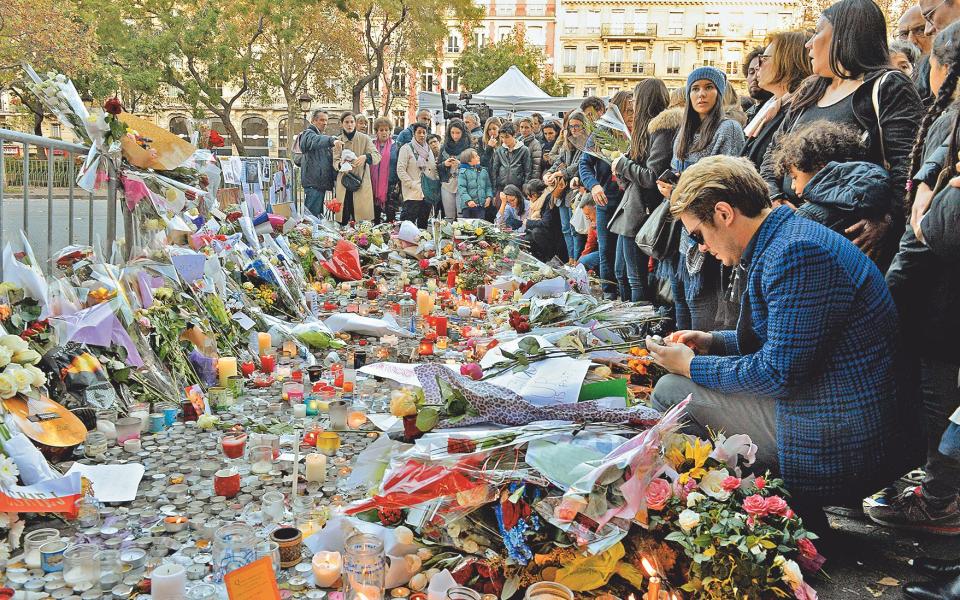
In February 2017, Amimour requested a meeting with Salines after seeing that he had co-founded a support group for the victims of the Paris attacks, 13Onze15 Fraternité et Verité. The two fathers have since met many times, and built a relationship on trust, a need for understanding and a shared crusade for the prevention of radicalisation.
‘What we are, above all else, is two fathers who have both lost a child,’ says Salines.
They have also written a book together, We Still Have Words: A Story of Hope and Friendship in the Shadow of the Bataclan Attacks, based on their conversations. Salines’s decision to meet with the father of a terrorist prompted some criticism on social media – he has been called ‘an Islamo-leftist’ and an ‘accomplice of Islamism’ – and yet the book received widespread praise when it was published in France at the start of the year. The English translation is out next week in the UK.
When Amimour first approached him for a meeting, Salines admits he was nervous. His wife and sons were supportive and understanding, but they had no interest in going to meet Amimour themselves. ‘I understood that,’ Salines says. ‘It is difficult for them, as it is for the family of many victims to meet with somebody who is so closely related to one of the perpetrators. It’s not rational, it’s an emotional thing.’
He adds: ‘I didn’t know exactly what Azdyne wanted to tell me.’ He was worried that Amimour, who was clear that he himself was a victim of the attacks in that he too had lost a child, might want to join the organisation for the victims: ‘I was well aware that this would be totally unacceptable for most of our members.’
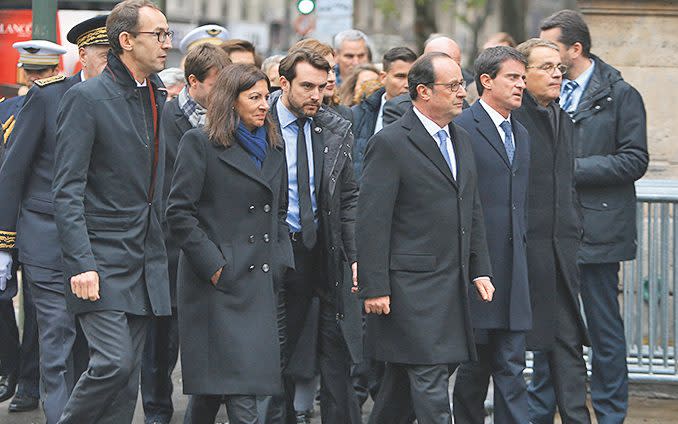
They met in a café on Place de la Bastille in central Paris in February 2017 (accompanied by a survivor of the attack, who herself had met the mother of one of the other attackers), and they talked for two hours. Azdyne shared his life story: how he had been born in Algeria; had 13 siblings and an illiterate mother; how he had overcome poverty and moved to France in his late teens, determined to make a life for himself. At first he worked in the film industry, which he fell into by chance, and then he ran a clothes shop.
Samy, he explained, had slipped away from them gradually, becoming withdrawn. By his early 20s, he had fallen into the influence of radicals who he followed on the internet. He began setting his alarm for 4am to go to the mosque, stopped wearing ‘European’ clothes, and eventually dropped out of a law degree.
The first raid on the family apartment had been in October 2012. Samy, then 25, lived at home. He was hooded and taken away, and spent four days under arrest. ‘It was difficult to exert much influence over him,’ Amimour told Salines.
Salines remembers that first meeting well. ‘It moved me deeply.’ In Amimour he saw a man who loved life, was tolerant, humane and self-taught. Of Georges Salines, Amimour remembers ‘there was such warmth in his touch when we shook hands’.
Salines had already written a book, The Unspeakable, from A to Z, following the attack; it was, he says, a form of therapy. (In it, he describes the terrorists who killed his daughter as ‘victims of their own madness and of their recruiters’).
The idea of a joint book of dialogue between the fathers was mooted in September 2018, by Sébastien Boussois, an advisor to a number of programmes and organisations combating radicalisation and extremism. Salines was nervous, but he adds, ‘Why should I refuse to engage in such a dialogue? I have absolutely no reason to blame the father for his son’s crimes.’

Meanwhile Amimour drew strength from Salines. Having spent over a year unable to speak of his son to anybody, least of all Mouna, who was consumed by grief and shame, finally he had found someone to open up to. ‘It’s been hard for me to mourn,’ says Amimour. ‘Because up until now I am always asking, “Why?” I can’t figure out why. Maybe I learned from Georges that it was because there was something missing in Samy’s flourishing as a person. I feel guilty because I didn’t find a solution.’
He adds: ‘I was lost when I contacted Georges. I was seeking people who could bring out what was inside me… When I am with Georges, I open myself up completely. There is no sense of unease. There is purely understanding and complicity between us.’
‘I feel the same way,’ says Salines, nodding.
‘What I get from [my connection with Azdyne] is that it is part of my effort for fighting the extremism, the hate, the lack of communication between groups of different cultures within French society. It is my fight and fighting it has helped me a lot to get on my feet again after the attacks. Lola is always with me. Every day I think about her. It is a way to honour Lola’s memory.’
Amimour cried when contemplating that Samy could have been the terrorist who killed Lola. Salines, too, was devastated by the manner in which Amimour says that news of Samy’s death was broken to him after an interrogation. ‘I cannot start to imagine myself in his shoes,’ says Salines.
As part of the book, both men wrote letters to the other’s dead child. ‘Did I fail in my job as a father?’ Amimour writes to Lola. ‘I thought I was giving my son a good upbringing… I’m so, so sorry Lola… forgive us, forgive them.’ And to Samy, Salines writes: ‘You’re beyond the reach of my wishes. So it’s your parents, your sisters, your friends that my wishes are with. May they find reconciliation with your memory and go on their way in peace.’
The two men are very different. Salines is an atheist with Christian roots and is highly educated. Amimour is a Muslim and self-taught. Salines does not go so far as to call him ‘a friend’: ‘We have much in common but also many differences in our ideas, in our world view. I feel warmly towards him. To be able to issue the book and give lectures with him is part of my overall fight against the [religious] hate.’
The project has not been without difficulty. At one point it might have collapsed when Salines discovered Amimour believed 9/11 may have been a conspiracy. ‘If you’re going to try spreading those half-baked ideas, it’ll be hard for me to keep listening to you,’ Salines told him. He asked Amimour to read literature on the subject and revise his opinion. They also had differing points of view about Samy’s radicalisation. While Salines suggests it may have been a slow burn, dating back at least 10 years before 2015, Amimour views his radicalisation as ‘rapid’.
‘I think Azdyne is blind on what his son was doing and thinking,’ says Salines today. ‘I don’t blame him, particularly because I think there are many parents who behave exactly as he did. Parenting is a complicated thing. I don’t hold him guilty for what happened.
‘[Families like the Amimours] lose their child the first time when they realise they are not on the same page about religion, second time when they go to Syria and third time when they learn they are dead. These people suffer a lot.
‘I know that I suffer and that I did nothing and that my daughter was perfectly innocent but I am able to sympathise and feel their pain, too. I am probably in the minority but I’m not the only one. I have met other victims who are perfectly able to express the same sentiments as I do.’

Amimour often questions whether he could have done more to prevent Samy’s radicalisation: ‘Was I too soft on him?’ he asks aloud. ‘I don’t know... I am sure it took someone else to lead him on and sow the seeds of revolt and hatred.’
When Samy first left France for Syria in 2013, it was not illegal. A helpline for parents of people suspected to have been radicalised was set up the following year in France by the Inter-Ministerial Committee for the Prevention of Crime and Radicalisation but even then the Amimours did not report their son, fearing they might lose him completely.
They remain unclear, however, as to why he was admitted back into France before the attack, having been identified as an extremist.
Today, Salines says that writing the book has given him a purpose, as has staying in touch with Lola’s friends – including the friend who was with her in the Bataclan that night, and was also shot but survived. There is also the love of his granddaughter, Olivia, now four. ‘I would give everything for having Lola with me… But today I concentrate on the happy memories and I don’t spend too much time on the regrets.’
Amimour also has a granddaughter of the same age; he has never met her and she lives somewhere in Syria. Amimour is now trying to track down the child and hopes to bring her back to live in Paris.
As Salines says to Amimour at the end of the book: ‘We became grandparents almost at the same time. My granddaughter helped me to survive and I try to work every day to leave a better world for her. I hope with all my heart, Azdyne, that you will one day be able to bring your granddaughter back to be by your side.’
‘We have moved forward together,’ agrees Amimour, ‘and we must continue along this path, for our children’s sake. And for the sake of life itself.’
We Still Have Words, by Georges Salines and Azdyne Amimour, is out on Thursday (Simon & Schuster, £12.99)

